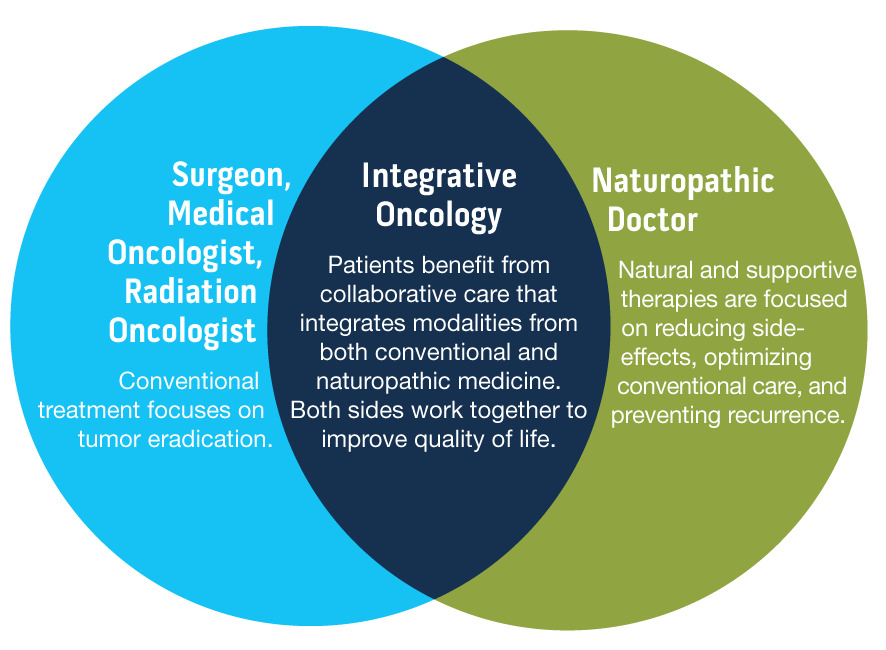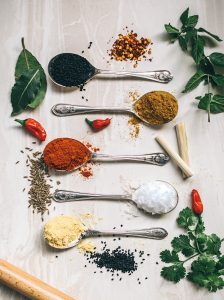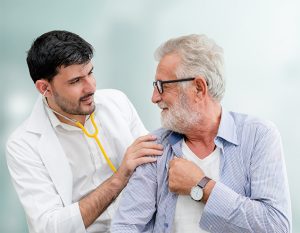Choosing Naturopathic Oncology
Author: Lucas Tims N.D. FABNO
A question I’ve been getting a lot lately is “What exactly is a Naturopathic Oncologist?” I thought it might be helpful to delve into the details of not just the title, but also the practice of Naturopathic Oncology and how it helps patients during all phases of their cancer journey.
What’s in a title?
It takes a lot more than treating a cancer case here and there to call oneself a Naturopathic Oncologist. With the ever-changing landscape of cancer care, it is important for patients to connect with a practitioner who understands the complexities of the disease and who stays up-to-date with the latest research and practices.
The American Board of Naturopathic Oncology recognized this need and developed specific requirements for Naturopathic Doctors to earn a board-certified specialty designation – FABNO (Fellow of the American Board of Naturopathic Oncology). To earn this designation, ND’s must complete either or two-year oncology residency or have been in practice for five years and amassed 2400 contact hours with oncology patients. Additionally, practitioners must submit cases for review by board examiners and pass a certification exam. Currently, there are just over 100 Naturopathic Doctors with the FABNO designation throughout North America.
 Naturopathic Oncology in a Nutshell
Naturopathic Oncology in a Nutshell
I think it is important to note that Naturopathic Oncology doesn’t aim to replace or challenge conventional cancer treatment. Most often, it serves as additional support.
Naturopathic Oncologists use their knowledge of naturopathic medicine and apply it to the field of cancer care. The patients I see are usually undergoing traditional cancer treatments such as chemotherapy and radiation in tandem with many of the naturopathic methods I discuss later in this article. The result is an integrated and comprehensive approach to cancer care.
The Naturopathic Oncology Philosophy
From a philosophical standpoint, Naturopathic Oncology differs from traditional oncology in several ways. The following are some key tenets naturopathic oncologists use to guide them in caring for patients with cancer.
A Holistic Approach
If we had to narrow it down to one basic tenet, this would be the one. Naturopathic Oncology is holistic. We don’t just look at the disease and how to eradicate it but aim to unearth the underlying causes, risk-factors that may exacerbate the disease, and all methods available to support the patient on their journey back to health.
Epigenetics
Epigenetics is the study of how lifestyle and environmental factors alter the way our genes behave. Traditionally, cancer has been viewed as a genetic disease, but research is showing that the initiation and progression of cancer are also impacted by epigenetics. Put simply, our lifestyle, behaviors, and environment may determine whether or not a genetic predisposition to cancer manifests into the disease or lies dormant. They may also determine how the disease progresses. Addressing lifestyle and environmental risks are part of the treatment approach.
Treating the human that has cancer (not just the disease)
Conventional medicine often only looks at symptoms and disease and ways to “get rid” of them. Naturopathic Oncologists see the person and aim to understand the individual’s physical, mental, and emotional needs. Are they constitutionally weak and require a boost? Are they lacking emotional support from family and friends? Why do they think they have cancer? These and others are the important questions that conventional medicine doesn’t typically address.
Complements the disease-focused approach (fills in the gaps in care)
Piggybacking on the 3rd tenet, Naturopathic Oncology fills in the gaps left by conventional cancer care.
In addition to treating the disease, Naturopathic Oncology addresses side-effects caused by conventional therapies, diet and lifestyle factors that contribute to disease progression or prevention, and restoring a person’s biological resources for fighting disease.
Moreover, cancer is more than just a disease, it can be a shocking, frightening, and life-altering diagnosis. For some, it’s a wake-up call. Every person experiences it in different ways and Naturopathic Oncologists aim to support and understand the individual experience.
Prevention
The best way to beat cancer is to never have it in the first place. The second best way to beat cancer is to prevent it from progressing or coming back. Like I mentioned above, conventional care is focused on getting rid of an already existing problem. A big part of Naturopathic Oncology is taking steps to prevent the problem from occurring (or recurring) in the first place.
 Healing power of nature
Healing power of nature
This tenet is one of the principles of Naturopathic Medicine as a whole. Naturopathic Doctors value the body’s innate ability to heal and the role that natural methods play in the process. This applies to any disease, including cancer.
Evidence-based, naturally focused
The modalities used by naturopathic oncologists are research supported. Safety and efficacy are our highest priority when recommending natural cancer treatments.
Naturopathic Oncology Modalities
Because Naturopathic Oncology seeks to support the person rather than just fight the disease, there are several modalities available to our patients. Some modalities are used to enhance conventional methods for tumor eradication, while others focus on alleviating side-effects, boosting the patient’s biological resources, or supporting their mental and emotional health. As always, treatment is determined based on the individual needs of the patient.
IV or Injection Therapies
IV’s and injections are used to deliver high doses of nutrients and therapeutic compounds such as mistletoe, both of which can help improve quality of life and may aid in tumor suppression.
Nutrition/Metabolic Therapies
Patients are often advised to make dietary changes to include more nutrient-rich whole foods and remove foods that are potentially harmful or toxic. Specific and individualized supplement protocols are also used. Metabolic therapies may also include more rigid protocols such as fasting. 2
Repurposed Drugs
Common drugs such as aspirin, metformin, statins, doxycycline and mebendazole can be used outside their common indications to aid in cancer treatment. 3
Acupuncture/Traditional Chinese Medicine
Acupuncture is an effective treatment for mitigating side-effects like nausea and vomiting that often accompany conventional treatments. 4
Mind/Body therapies
Yoga, meditation and other mind/body modalities are often used to abate anxiety and stress in cancer patients. 5
Homeopathy
Homeopathy is used to ease some of the side-effects of conventional cancer therapies and is helpful for symptoms that arise after cancer treatment is complete. 6
 Support through the entire cancer journey
Support through the entire cancer journey
Cancer treatment begins with prevention. It’s never too early (or too late) to start treatments and make changes that can reduce your risk of developing cancer in the first place. Should you receive a diagnosis, we are here to support you every step of the way. Naturopathic Oncology modalities can help during the early or advanced stages of cancer, during treatment, post-treatment, and even end of life care.
To learn more about Naturopathic Oncology at the Riordan Clinic, call 800-447-7276
References
- Schötterl S, Huber SM, Lentzen H, Mittelbronn M, Naumann U. Adjuvant Therapy Using Mistletoe Containing Drugs Boosts the T-Cell-Mediated Killing of Glioma Cells and Prolongs the Survival of Glioma Bearing Mice. Evid Based Complement Alternat Med. 2018 Aug 27;2018:3928572. doi: 10.1155/2018/3928572. PMID: 30224928; PMCID: PMC6129785.)
- (de Groot, S., Pijl, H., van der Hoeven, J., & Kroep, J. R. (2019). Effects of short-term fasting on cancer treatment. Journal of experimental & clinical cancer research : CR, 38(1), 209. https://doi.org/10.1186/s13046-019-1189-9)
- (Pantziarka, P., Verbaanderd, C., Sukhatme, V., Rica Capistrano, I., Crispino, S., Gyawali, B., Rooman, I., Van Nuffel, A. M., Meheus, L., Sukhatme, V. P., & Bouche, G. (2018). ReDO_DB: the repurposing drugs in oncology database. Ecancermedicalscience, 12, 886. https://doi.org/10.3332/ecancer.2018.886)
- (Shen J, Wenger N, Glaspy J, et al. Electroacupuncture for control of myeloablative chemotherapy-induced emesis: A randomized controlled trial. Journal of the American Medical Association. 2000;284:2755–2761.
- ( Carlson LE, Doll R, Stephen J, et al. Randomized controlled trial of mindfulness-based cancer recovery versus supportive expressive group therapy for distressed survivors of breast cancer (MINDSET) Journal of Clinical Oncology. 2013 JCO. 2012.2047. 5210)
- (Kassab S, Cummings M, Berkovitz S, van Haselen R, Fisher P. Homeopathic medicines for adverse effects of cancer treatments. Cochrane Database Syst Rev. 2009 Apr 15;(2):CD004845. doi: 10.1002/14651858.CD004845.pub2. PMID: 19370613.)





